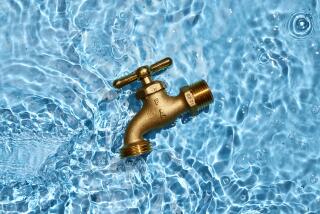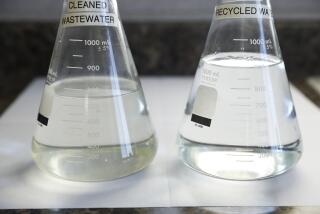Water Purifiers Not Always Bugproof
The great outdoors can turn grim quickly for hikers, campers and backpackers who drink water from streams and rivers. They risk ingesting a host of bacteria, viruses and other bad bugs.
The bugs that water purification experts mention most often are the parasites Giardia lamblia and Cryptosporidium parvum. Both are protozoa that can cause diarrhea, sometimes severe, and leave victims feeling lousy even after treatment begins.
The best defense, according to the federal Centers for Disease Control and Prevention, is to boil water used for drinking or cooking for one minute (three minutes at altitudes of 6,562 feet or more).
An alternative treatment is chemical disinfection with iodine (tincture or tablets), although that cannot be relied on to kill Crypto-sporidium unless the treated water sits for 15 hours before use.
Manufacturers promote portable water filters and purifiers as a more convenient option. They’re sold at sporting goods stores and by Internet, but consumers should know that the products aren’t created equal. The portable filters “provide various degrees of protection against microbes,” according to the CDC.
Reverse-osmosis-type filters eliminate viruses, bacteria and protozoa, but they’re usually larger than outdoor travelers like to tote.
Micro strainer filters with pore sizes in the 0.1- to 0.3-micrometer range can remove bacteria and protozoa from drinking water, but not viruses, according to the CDC. To get rid of viruses, filter the water first, then use a chemical disinfectant such as iodine.
Other filters, such as those with iodine, can kill bacteria and some viruses but not Cryptosporidium or Giardia in cold water.
One popular online outdoors merchandiser features a new, personal-size purification system: a filter on a 26-ounce bottle of the sort bicyclers tote. It claims to kill viruses, bacteria and protozoa.
The CDC can’t say which models on the market are most effective, citing a lack of published studies. But consumers can check water purifiers that claim to be registered with the Environmental Protection Agency.
Some water purifiers have carbon filters impregnated with materials such as silver. If they claim to kill microorganisms, these products must be registered, says Amy Miller, an EPA enforcement officer. Models with carbon-only filters are not required to register, but the product must be made in an establishment that is EPA-registered, she says.
Depending on the product, if it meets EPA standards, the filter packaging is likely to carry an EPA registration number or an EPA establishment registration number, or both. If a filter claims to kill bacteria, Miller says, it must have both an EPA registration number and an establishment number. If it just filters the water, it must carry an EPA establishment number.
To confirm that a product is registered, call the National Antimicrobial Information Network, an EPA-funded information line, telephone (800) 447-6349, weekdays 7:30 a.m. to 4:30 p.m. Pacific time.
Healthy Traveler appears the second and fourth Sundays of the month. Kathleen Doheny can be reached at [email protected].






